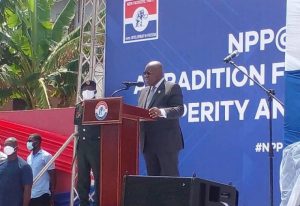NPP’s Struggle to Break the Eight-Year Mantra in the Ashanti Region: A Comprehensive Analysis
The New Patriotic Party (NPP) has been a dominant force in Ghanaian politics for decades, with a stronghold in the Ashanti Region. However, the party has faced a significant challenge in breaking the eight-year mantra, which refers to the inability of any political party to secure power for more than two consecutive terms. This article delves into the reasons behind the NPP’s struggle to break this cycle in the Ashanti Region.
1. Historical Context
The Ashanti Region has been a stronghold for the NPP since the party’s inception in 1992. The region has consistently voted for the NPP in every election, with the party winning the majority of parliamentary seats and the presidential vote. However, despite this strong support, the NPP has not been able to break the eight-year mantra, with the opposition National Democratic Congress (NDC) winning the presidency in 2008 and 2012.
2. Voter Fatigue
One of the primary reasons for the NPP’s struggle to break the eight-year mantra in the Ashanti Region is voter fatigue. After two consecutive terms in power, some voters may feel that the NPP has had enough time to implement its policies and may be looking for a change. This sentiment is particularly strong among younger voters, who may not have experienced the NDC’s rule and are more open to trying a new party.
3. Economic Challenges
The NPP’s inability to break the eight-year mantra in the Ashanti Region can also be attributed to economic challenges. While the party has implemented several policies aimed at boosting the economy, such as the One District, One Factory initiative, some voters may feel that these policies have not had a significant impact on their lives. Additionally, the COVID-19 pandemic has exacerbated economic challenges, leading to job losses and reduced incomes for many Ghanaians.
4. Internal Party Dynamics
Another factor contributing to the NPP’s struggle to break the eight-year mantra in the Ashanti Region is internal party dynamics. The party has faced several internal divisions and power struggles, which have led to a lack of unity and cohesion. This lack of unity can make it difficult for the party to present a united front during elections, which can be a significant disadvantage in a region where the NPP has traditionally enjoyed strong support.
5. Opposition Strategies
The NDC has also played a role in the NPP’s struggle to break the eight-year mantra in the Ashanti Region. The opposition party has employed several strategies to weaken the NPP’s support in the region, such as targeting key constituencies and highlighting the government’s shortcomings. These strategies have been effective in eroding the NPP’s support base in the region, making it more difficult for the party to secure a third consecutive term in power.
In conclusion, the NPP’s struggle to break the eight-year mantra in the Ashanti Region can be attributed to a combination of factors, including voter fatigue, economic challenges, internal party dynamics, and opposition strategies. To overcome these challenges and secure a third consecutive term in power, the NPP will need to address these issues head-on, by presenting a united front, addressing economic challenges, and engaging with voters to demonstrate the party’s commitment to their needs and concerns.
Ashantibiz




